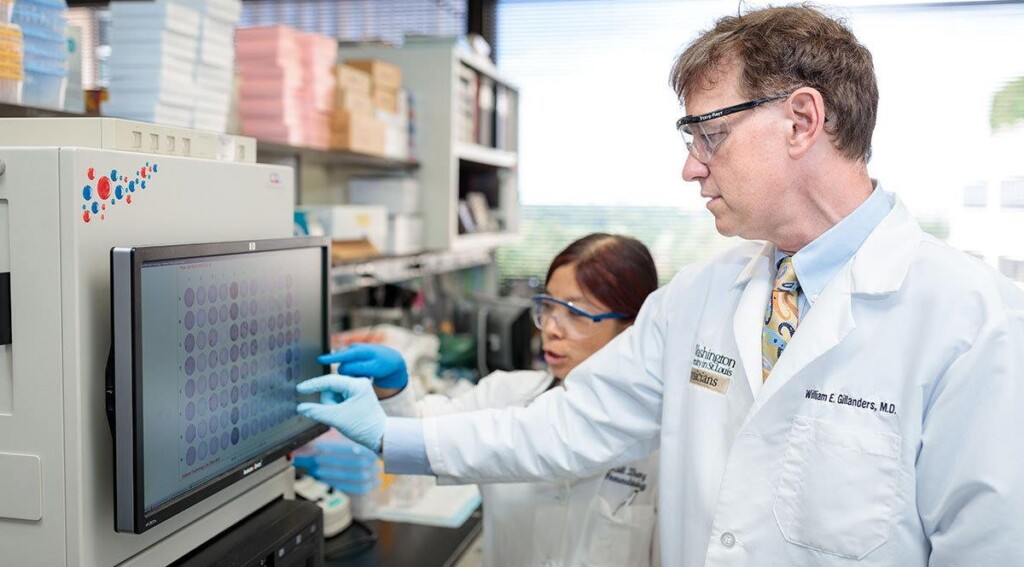 Study author William Gillanders – credit, SWNS
Study author William Gillanders – credit, SWNSBreast cancer patients have been given fresh hope after a new vaccine showed “promise” in treating an aggressive form of the disease.
The results came in a clinical trial involving American patients with triple-negative breast cancer who received an experimental drug designed to prevent the recurrence of tumors.
The trial, using a therapy designed by researchers at Washington University School of Medicine in St. Louis, is the first to report results for a “neoantigen DNA vaccine” for breast cancer patients.
The findings, published in the journal Genome Medicine, showed the vaccine to be “well-tolerated” and to properly stimulate the immune system.
The trial involved 18 patients diagnosed with a yet-to-metastasize triple-negative breast cancer. Each patient received the standard of care and three doses of a personalized vaccine tailored to target key mutations in their specific tumor and train immune cells to recognize and attack any cells bearing the mutations.
Following treatment, 14 of the 18 patients showed immune responses to the vaccine and, after three years, 16 patients remained cancer-free.
While the early-stage trial was designed to evaluate the safety of the vaccine and did not include a control group to determine efficacy, the research team analyzed historical data from patients with triple-negative breast cancer treated with the standard of care only.
In that group, on average, only about half of patients remained cancer-free three years after treatment.
Study senior author Professor William Gillanders, of Washington University School of Medicine, admits it’s not a perfect comparison, and says there are key limitations of this type of analysis.
“But we are continuing to pursue this vaccine strategy and have ongoing randomized controlled trials that do make a direct comparison between the standard of care plus a vaccine, versus standard of care alone,” he said.
“We are encouraged by what we’re seeing with these patients so far.”
Triple-negative breast cancer is an aggressive tumor type that grows even in the absence of the hormonal fuel that drives the growth of other types of breast cancer. It currently has no targeted therapies and is usually treated with traditional approaches including surgery, chemotherapy, and radiation therapy.
For the trial, patients with triple-negative breast cancer who still had evidence of a tumor remaining after a first round of chemotherapy were eligible to participate.
Researchers say such patients are at “high risk” of cancer recurrence even after the remaining tumor is surgically removed.
After surgery, the team analyzed and compared the tumor tissue with the healthy tissue of the same patient to find unique genetic mutations in the cancer cells.
These may alter the proteins only in the tumor, making it possible to train the immune system to go after the altered proteins and leave healthy tissues alone.
Using software they designed, the researchers selected altered proteins called neoantigens that were made by the patient’s tumors and that were identified as most likely to trigger a strong immune response.
GOOD MEDICINE NEWS: AI Detected Her Early Breast Cancer After Annual Test Came Back as Normal: ‘I feel so lucky’
On average, each patient’s vaccine contained 11 neoantigens—ranging from a minimum of 4 to a maximum of 20—all of which were specific to their tumor.
“These are complex algorithms, but in general, the software takes in a list of mutations and interprets them in the context of their potential to be good neoantigen candidates,” said Professor Malachi Griffith, who co-led the software development.
“The tools rank the possible neoantigens based on our current knowledge of what matters in stimulating the immune system to attack cancer cells.”
MORE ON CANCER VACCINES: Cancer Vaccine Triggers Fierce Immune Response to Fight Malignant Brain Tumors in Human Patients
Trial Skin Cancer Vaccine Dramatically Reduced Melanoma Relapse in Patients Receiving Immunotherapy
Several studies of cancer vaccines developed at Washington University School of Medicine are currently ongoing.
In some of the trials for breast cancer patients, personalized vaccines are being investigated in combination with immunotherapies called checkpoint inhibitors that boost the action of T cells.
SHARE This Great Development On Social Media With The Women In Your Life…
Source link

